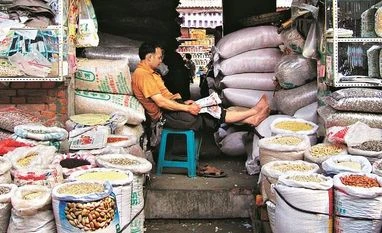The gross domestic product (GDP) data released for the second quarter of the fiscal year 2019-20 (Q2FY20) sadly reaffirms that India’s economy is in need of serious repair.
Despite the government pushing its spending up by a strong 15.6 per cent this quarter, our economy registered a very disappointing real growth of just 4.5 per cent. Worryingly, investments recorded only 1 per cent growth, and manufacturing shrank by 1 per cent. At just 6.1 per cent, nominal growth was the lowest of this GDP series.
India is in the midst of an investment and consumption slump.
There is pressure on policy makers for further fiscal and monetary support to the economy. However, focusing primarily on these would be a mistake on several counts.
To begin with, the true extent and quality of India’s fiscal deficit is far worse than is acknowledged. While the official combined fiscal deficit of central and state governments was 5.9 per cent of GDP in FY19, our governments and public sector enterprises borrowed an estimated 9.7 per cent of GDP. This was the highest of this decade, and well in excess of our dwindling net household savings.
Worryingly, much of these funded revenue expenditures, rather than productive capital investments. We are borrowing off our children’s future, to foot our current bills.
In addition, whatever the justification, the Reserve Bank of India (RBI) effectively printed money to help support this borrowing with its bond purchases and surplus transfers.
History tells us that printing and spending is rarely, if ever, the road to sustained prosperity.
More importantly, this print and spend does little to address the real sectoral issues that stare us in the face.
For one, our financial services ecosystem is in no state to adequately fund our consumption or investment needs. The true level of our non-performing assets is higher than acknowledged, and we will likely need a one-time radical approach to recognise and resolve this overhang. Going forward, public sector bankers need more operational autonomy, and we need reforms to tighten governance across the ecosystem and reduce the pervasive trust deficit.
There are several other sectors of the economy that are crying out for reform and a sustainable operating context — power, real estate, construction, airlines and shipping, telecommunications, and agriculture, to name some.
Likewise, to create jobs, our manufacturing sector requires reforms of our land and labour laws, and other steps to improve on-the-ground ease of doing business. We import a big chunk of manufactured products, despite having a capable and underemployed workforce.
Linked to this is an excellent opportunity to sustainably boost growth over the medium term — single-mindedly focusing on drawing in manufacturing foreign direct investment (FDI), at a time when global manufacturing supply chains are looking beyond China.
Admittedly, these feel like boil-the-ocean long-term prescriptions, at a time when we are clamouring for here-and-now palliatives. However, we have to be careful about overuse of our fiscal and monetary painkillers. While inflation, currency markets, the global context and financial stability have held up so far, we are vulnerable and could betested in the not-so-distant future.
The good news is that over the past few months, the government has begun tackling some of the core issues. The September 20 corporation tax rate cut and recent steps to modify labour laws will boost investment over the medium term and attract FDI. Similarly, efforts to help fund stalled real estate projects, expand the scope of our insolvency and bankruptcy proceedings to cover NBFCs, and provide relief to telecom companies signal the right intent.
However, much more needs to be done to tackle the sectoral and structural issues described above head-on. In July 1991, we saw a series of policy measures that converted an economic crisis into an intergenerational opportunity for our country. With the right structural reforms and steadfast execution, there is every opportunity for us to look beyond the current issues and herald the next wave of sustainable economic growth.
Views expressed are personal
Unlock 30+ premium stories daily hand-picked by our editors, across devices on browser and app.
Pick your 5 favourite companies, get a daily email with all news updates on them.
Full access to our intuitive epaper - clip, save, share articles from any device; newspaper archives from 2006.
Preferential invites to Business Standard events.
Curated newsletters on markets, personal finance, policy & politics, start-ups, technology, and more.
)